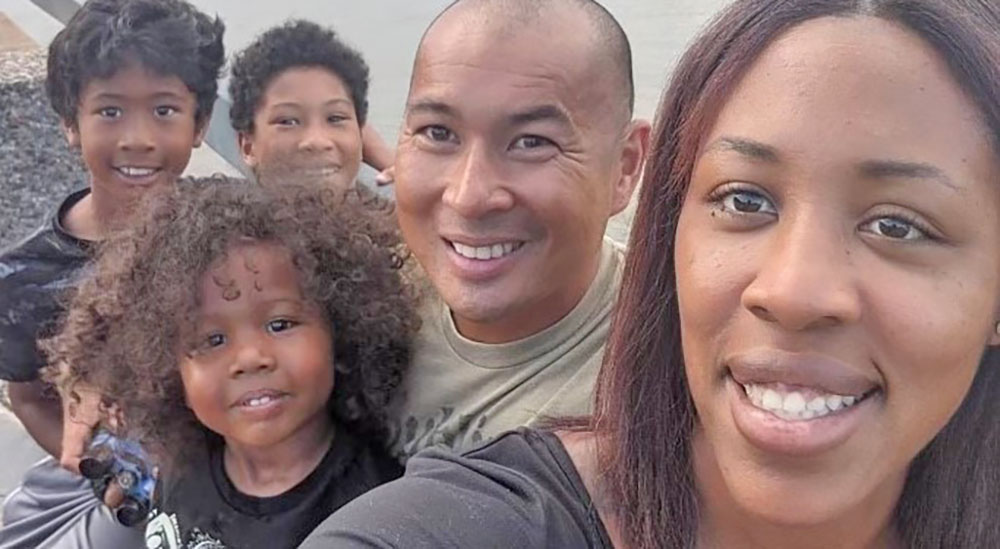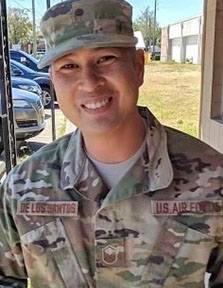Bho Delos Santos is an upfront man. He likes to be honest about things in his life, like his diagnosis for Aphasia, a condition resulting from an injury to the brain that impacts communication but doesn’t affect intellect or hearing.
Aphasia involves varying degrees of impairment in four primary areas: spoken language expression, spoken language comprehension, written expression and reading comprehension.
Delos Santos’s aphasia began after he suffered a stroke in 2018 when he was 34.
“I keep a card with me that I can give to people and say, ‘Here ya go – I have aphasia,’” he said. “Many people don’t know what aphasia is. This card lets people know that I am intelligent but I need you to bear with me because my speaking ability is shot.”
“Letting people know I have aphasia, we can work together”
Delos Santos occasionally has trouble finding words and understanding what is said to him. He uses reading, writing, facial expressions and gestures to share what he is trying to communicate with others. His intelligence is not compromised and he is a successful businessman.
“I understand everything people are saying to me,” he said. “I just have difficulty finding the right words when I reply. By letting people know that I have aphasia and what it is, this helps me educate the people about what is happening and how we can work together.”
With the help of his support system—including his mom, dad, and other family members—he began his rehabilitation. Three years into his journey, he participated in VA Pittsburgh’s Program for Intensive Residential Aphasia Treatment and Education (PIRATE) which provides treatment to people with aphasia.
Treatment through PIRATE can help patients improve their listening, speaking, reading or writing abilities, and it may include the use of communication technology.
Helpful tools on his cell phone
“Bho impressed me right off the bat because, more than any other person I’ve worked with, he had already begun problem-solving and effectively using helpful compensatory strategies with his cell phone,” said Miranda Babiak, speech language pathologist with Pittsburgh VA.
Helpful strategies and tools included read-aloud and text-to-speech functions on his cell phone that allowed him to read and respond to text messages and emails, and to make lists or notes.
Connecting a Veteran in need of advanced treatment services with Dr. Babiak in Pittsburgh would have been logistically challenging but was made possible by VA Telehealth services.
“We customized the care plan to meet the goals of Mr. Delos Santos,” said Babiak. “Bho already had these really good tools in place so we used them to help increase exposure and opportunities to bolster his own reading and writing skills.”
Moving forward, celebrating success in increments
While some people shy away from hard things, Delos Santos consistently puts himself into greater and greater challenges.
“I wanna get better, so I started a lawn care business and made sure that part of the business is talking with people. I also coach football for my son’s team. That’s a little easier because I can use a lot of hand motions to communicate,” he said.
If that wasn’t enough, Delos Santos is attempting to finish his bachelor’s degree and has just four classes left. He wants to be a counselor to help other Veterans and people with physical and mental health challenges.
Having supportive staff helps keeps things in perspective.
“I know Bho wants to be back to 100 percent, but it’s also important to recognize how far he has come,” said Babiak. “If you feel like you’re at 70 percent now and then you get up to 75 percent, reward yourself.”
Learn more about VA’s PIRATE program
Veterans enrolled in VA health care and active-duty service members diagnosed with aphasia may be eligible for the VA Program for Intensive Residential Aphasia Treatment and Education (PIRATE) program.
VA’s Program for Intensive, Residential Aphasia Treatment and Education (PIRATE) has been in operation since 2009, with the mission of providing advanced clinical access to effective, evidenced-based speech and language intervention services for Veterans with aphasia.
VA Pittsburgh is the only VA facility nationwide that offers an intensive, comprehensive aphasia program. Since its inception, the program has received referrals from 46 states and treated 213 Veterans or active-duty participants with aphasia.
If you know of a Veteran who might benefit from participation in the PIRATE Program, please visit www.va.gov/pittsburgh-health-care/programs/pirate or contact the PIRATE program coordinator at mary.sullivan@va.gov.
Learn more about VA’s PIRATE Program at www.va.gov/pittsburgh-health-care/programs/pirate/. Learn more about VA Speech Pathology Services at: www.rehab.va.gov/slp.
Topics in this story
More Stories
The 2024 National Veteran Suicide Prevention Annual Report provides the foundation for VA’s suicide prevention programs and initiatives.
Theranostics is a specialized field of nuclear medicine that uses a two-pronged approach to diagnose and treat cancer.
Air Force Veteran Shireta Jones overcomes obstacles with support from VA and adaptive devices to continue her passion for pickleball.








It sounds good but I’m skeptical about the VA and there programs. As of mid January,. I’ve been waiting 3 years for mental health services. I had a call from someone the other day and I haven’t heard back. I have an extensive history but so far no one does they say